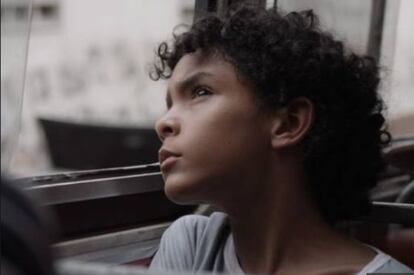After the controversy, the movie…
Venezuela's ‘Pelo malo,’ winner of the Golden Shell at San Sebastián last year, arrives in theaters The movie has kicked up a major row between Chávez supporters and their opponents


Around four-and-a-half months ago director Mariana Rondón and producer Marité Ugás won the Golden Shell for Best Film at the San Sebastián Festival with their movie Pelo malo (or, Bad Hair). It was the first time that a Venezuelan production had triumphed at a major film competition. “The award opened doors for us in terms of respect, in terms of a cinematic process that is growing,” they say. But the triumph ended up tarnished by the media storm whipped up back home by critical comments the pair made to El PAÍS about the polarized political and social situation in Venezuela.
Thankfully the film’s quality has prevailed over other debates in these past months and it has continued its triumphant festival run, winning the FIPRESCI prize at Thessaloniki and various awards in Turin, Mar del Plata in Argentina and Viña del Mar in Chile. Now the time has come for its commercial release: first in Spain, where it comes out this Friday, then in France, Switzerland and Brazil, before arriving in Venezuela on May 1. “Leaving the festival circuit and facing the public is exciting,” says Rondón. “I am also worried about the release in my country. Our distributor believes in it and has increased the number of copies. In general, the most recent national productions have been seen a lot by the Venezuelan public and that is increasing expectations.”
The saddest thing is that the row diverted attention about what really mattered most to us: the prize”
The growing demand from festivals to screen Pelo malo has “slowed down” the pair’s creative rhythm. Back in September they were preparing a new film, this time with Ugás directing – when one produces, the other directs. “This necessary outing hasn’t allowed us to shut ourselves off, like the project requires,” says Ugás, who was born in Peru but has pursued her film career entirely in Venezuela. “But we are not stopping.”
In Venezuela pelo malo refers to the tight curly hair of many black people. The film’s main character, nine-year-old Junior, wants to straighten his so as to look like a singer. However, this change of hairstyle brings him into confrontation with his mother, who thinks her son is turning homosexual. “People talk about different aspects depending on where the film is screened. In Istanbul they talked to me about religion and politics, in South America they said the theme was racism, in Europe the weight is very much on sexual identity. It is a very wide spectrum,” says Rondón. “For me it talks about respect for others, about differences.”
At the last Goya Awards the prize for Best Foreign Film in the Spanish Language was taken by another Venezuelan film, Azul no tan rosa, which also talks about homosexuality. Ugás says the two are very different and belong to separate genres. “What it true is that the debate about homosexuality and its acceptance in our society is in the air,” Rondón says. “Five more films focusing on the topic are on their way. Venezuelan liberalization is the new national film genre. Before there were so few films that Venezuelan cinema was a genre in itself. Today so much is produced that there is a lot of variety when it comes to feature films.”
Ugás regrets the mess that her words about the late Hugo Chávez and current Venezuelan President Nicólas Maduro caused after the San Sebastián festival, and the storm they kicked up back home: “What a headache!" she says. "For us the saddest thing is that it diverted attention about what really mattered most to us: the prize.”
“Everyone left us out in the cold and attacked us politically,” explains Rondón. “The [later] prizes vindicated the fact that we are more than just a big row in the press, but filmmakers with serious and significant work.”
In these last few months there have been no changes in the way Venezuela deals with homosexuality, says Rondón. “Nothing has happened to change our views. But the film goes much wider than the homosexual theme and the tour of the festival circuit has confirmed this for me. I might have doubted it in San Sebastián; now I am sure that I got the balancing act of the open doors and wide looks that make viewers search for their place in the story.”
Tu suscripción se está usando en otro dispositivo
¿Quieres añadir otro usuario a tu suscripción?
Si continúas leyendo en este dispositivo, no se podrá leer en el otro.
FlechaTu suscripción se está usando en otro dispositivo y solo puedes acceder a EL PAÍS desde un dispositivo a la vez.
Si quieres compartir tu cuenta, cambia tu suscripción a la modalidad Premium, así podrás añadir otro usuario. Cada uno accederá con su propia cuenta de email, lo que os permitirá personalizar vuestra experiencia en EL PAÍS.
¿Tienes una suscripción de empresa? Accede aquí para contratar más cuentas.
En el caso de no saber quién está usando tu cuenta, te recomendamos cambiar tu contraseña aquí.
Si decides continuar compartiendo tu cuenta, este mensaje se mostrará en tu dispositivo y en el de la otra persona que está usando tu cuenta de forma indefinida, afectando a tu experiencia de lectura. Puedes consultar aquí los términos y condiciones de la suscripción digital.








































